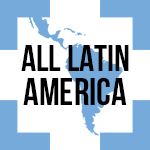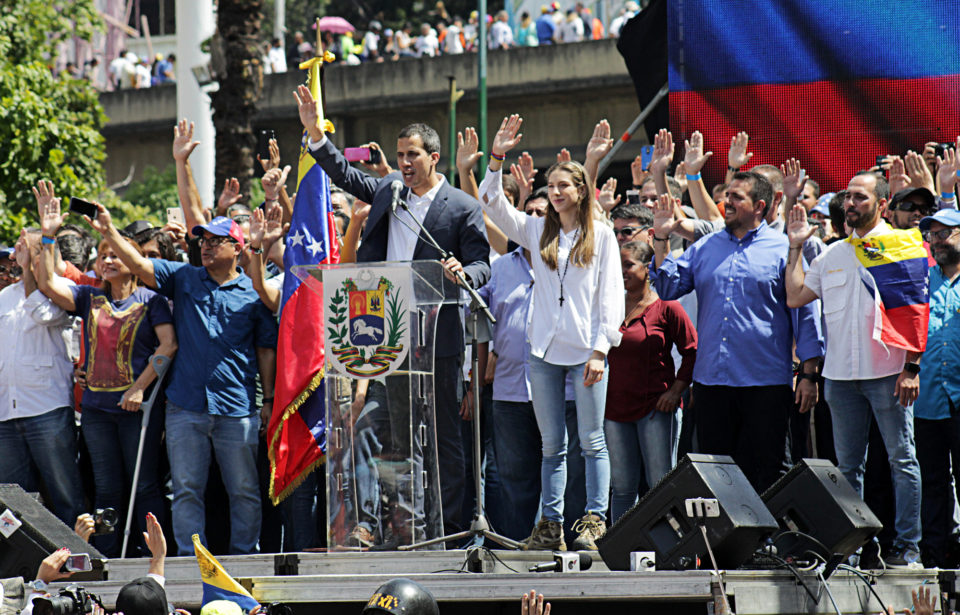During a monumental day of protest in Venezuela, after opposition head Juan Guaidó publicly denounced the rule of Nicolás Maduro and declared himself the nation’s leader, Colombian President Iván Duque recognized the rival of the socialist regime as the legitimate Venezuelan head of state.
In aligning with Guiadó, the 35-year-old political upstart who was chosen to take over the top position of the National Assembly earlier this month, Duque joins his peers from the United States, Brazil, Argentina, Chile, Peru, and several other Latin American countries in formally breaking ties with Maduro in favor of the opposition.
“Colombia recognizes Juan Guaidó as president of Venezuela,” said Duque in a public address from the World Economic Forum in Switzerland. He also urged Maduro to “step aside” to help usher in a “transition towards democracy, so that the Venezuelan people will be freed from the dictatorship.”
U.S. President Donald Trump issued a statement that was similar in tone but carries the power of the region’s largest power and was backed by a pledge of ongoing pressure to bring about leadership change.
“The people of Venezuela have courageously spoken out against Maduro and his regime and demanded freedom and the rule of law,” said Trump in a statement. “I will continue to use the full weight of United States economic and diplomatic power to press for the restoration of Venezuelan democracy.”
The proclamation of support for Guaidó from Trump was met with immediate condemnation from Caracas. Maduro swiftly announced that he was breaking all political ties with the United States, warning U.S. diplomats in Venezuela that they have 72 hours to leave the Andean nation.
The highest-ranking U.S. diplomat rejected this order, claiming that diplomatic ties with the country will remain intact but through the leadership of Guaidó.
“The United States does not consider former president Nicolas Maduro to have the legal authority to break diplomatic relations with the United States or to declare our diplomats persona non grata,” said U.S. Secretary of State Mike Pompeo in a statement.
He added that “the United States will take appropriate actions to hold accountable anyone who endangers the safety and security of our mission and its personnel.”
When asked by reporters from the Washington Post, neither the U.S. commander in chief nor another unnamed White House administration official would publicly rule out military action or an oil embargo against a Maduro regime that is facing the greatest threat to its power since the hand-picked socialist party head assumed office following the death of Hugo Chávez in 2013.
“When we say all options are on the table, it means all options,” a White House official reportedly told the Washington Post.
By contrast, Duque was quick to dismiss such options for regime game. “We’re not talking about military intervention,” he said in an address, as reported by the Associated Press. “We’re talking about a diplomatic consensus and also the support of the Venezuelan people.”
Compared to those in Washington, the fallout of this unprecedented crisis in Venezuela hits much closer to home for officials in Bogotá.
At least three million Venezuelans have fled their country in recent years, according to the United Nations. At least one million of those are living in Colombia now that its neighboring country has descended further and further into economic, social, and humanitarian despair.
Last December, the United Nations projected the overall exodus to hit 5.3 million before the end of 2019, with Colombia expected to become the host to an accumulated total of 2.2 million Venezuelans by that time.
Colombia has thus far largely played as a willing host to the refugees fleeing the violence, food shortages, lack of medicine, political oppression, and hyperinflation ravaging Venezuela. But lawmakers, two presidents, and top officials have stressed to the international community that they lack the resources to adequately manage the constant influx of migrants.
Colombian Foreign Minister Carlos Holmes Trujillo estimated last year that the migrant figure could quadruple by the end of 2021 if the crisis continues unabated. “In a scenario where the situation worsens, we’re talking about four million Venezuelans in Colombia,” he said at an event in Bogotá, per Reuters.
He projected the cost of such a scenario at some $9 billion in a country that is already facing a budget shortfall while trying to retain its credit rating and fund significant social and infrastructure projects as it transitions to its “post-conflict” era.
The United States has responded with at least $46 million USD in funding to support fleeing Venezuelans as they leave their homeland, often with little more than the clothes on their back for an uncertain journey that may end in Bogotá, another Colombian city, or often as far away as Peru.
The European Union has pledged at least $41 million USD to aid Colombia in dealing with the border and humanitarian crisis that is spilling into its territory. The United Nations offered up some $9 million USD in assistance for vulnerable Venezuelans last November.
(Photo credit: Alexcocopro)
This article was originally published by Finance Colombia. It has been reprinted with permission.


